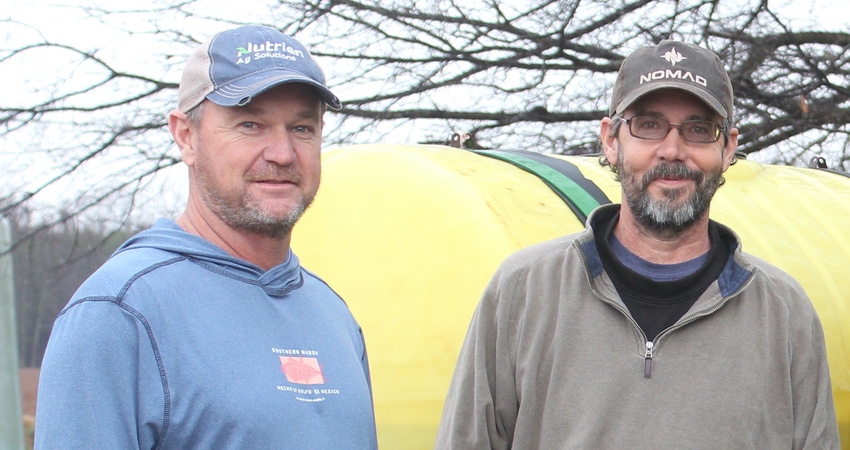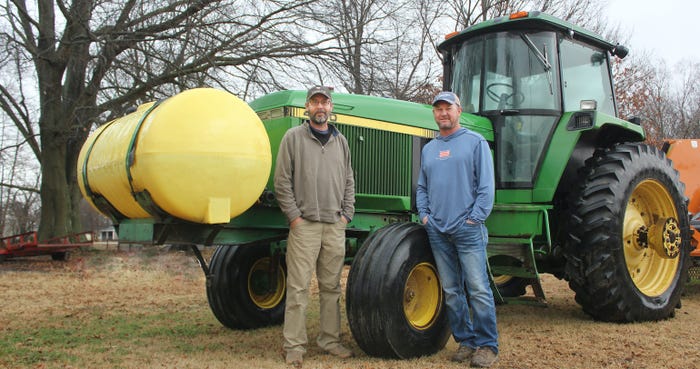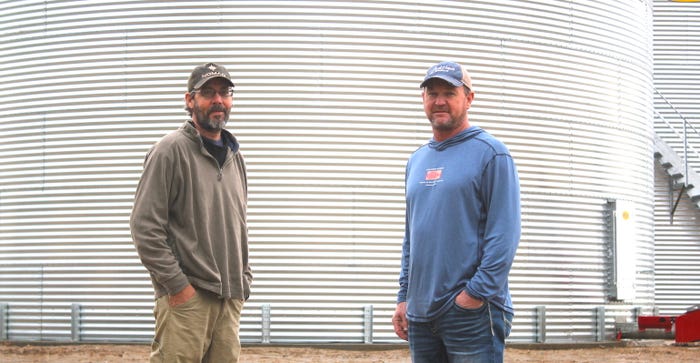
Thirty years ago, two teenagers had a dream of starting a farm.
In most cases that would be the beginning and end of the story. Starting a farm from scratch can seem like an unattainable goal. Not enough capital. Not enough land. No equipment. How do you even begin?
But Chris Peyton and Scott Mathis didn’t just dream. They got to work. Just out of high school they started farming 300 acres. They raised cotton and cattle. They didn’t inherit any land or equipment and what they had to work with was not exactly top rate, as Mathis recalled.
“We didn’t have a tractor with a cab. We had an old cotton picker that we used to run more at night than in the day. That’s because we had to work on it all day to get it to run, and by then it was dark,” Mathis said.
“One year we sprayed our entire cotton crop with 4-gallon backpack sprayers. We walked every row,” he said.
Peyton recalled long days and nights harvesting and hauling cotton and grain.
“We were hoping to be successful. We were working hard,” he said. “But I didn’t know you could make money the first 10 years we farmed.”

“We got where we are slowly. We ran a lot of old stuff for a long time. We really learned how to be mechanics.”
They stuck with it because farming is what they love, and eventually the work paid off. Today, these friends and business partners farm 5,000 acres of row crops. They have built a successful operation that has not just survived but thrived. Just this year, they won the Tennessee soybean yield contest.
And all the tractors now have cabs.
“It’s never been easy,” Peyton said. “When we first started, it was wanting to get better that drove us. That’s what drives us still.”
Farm partnership
Peyton and Mathis say they are often mistaken for brothers. While they are distant cousins, first and foremost they are lifelong friends — growing up less than a mile apart in the� small western Tennessee community of Cherry. They first worked together as kids on Peyton’s grandfather’s farm, often persuading other friends to help complete the chore list so there would be more time for hunting and fishing.
It is rare to see a farm partnership last 30 years without close family ties to bind it. The men say they are often asked how they have made it work for so long. They have trouble explaining it themselves. Aside from a few cotton picker purchases, they say they are almost always on the same page with farm decisions and recall few disagreements over the years.
“Your relationship has to be strong to make a business partnership work,” said Mathis. “For us it goes back to growing up together. We’ve lived within a mile of each other our entire lives. We’ve been friends our entire lives. In many ways, we’re like family.”
Relationship building and a tight-knit community also contributed to the success of the farm. The men recalled friends pitching when they first started farming. Once they even talked their pastor into joining the farm crew for about a week. Opportunities to expand became available due to local connections.
“People in the community have helped us so much,” Peyton said. “Landlords saw we were eager to try, and they gave us a chance. Farmers that quit farming, thought enough of us to give us an opportunity.”

High-yielding beans
Soybeans are the primary crop grown on their farm these days. For the past 10 years they have increasingly invested in their soybean crop. It started with improving their soybean fertility program. This winter they installed two grain bins to help with marketing and getting the crop out.
The investments showed out this year as they harvested a dryland field that averaged 97 bu/a. It earned them first place in Tennessee’s Top Bean Yield contest. The winning beans were an Asgrow 48X9 variety.
“We have several different soil types on our farm, and we like that variety because it does well across any type of ground,” Mathis said.
While Peyton and Mathis have moved their soybean planting dates up — planting as early as April 1 — the 97 bu/a field was planted on May 23. Population rate was 136,000.

Beyond preplant fertilizer, Peyton and Mathis attribute the yields to good ground and “perfect” weather.
Future of farming
Like most farmers, Peyton and Mathis are concerned about the effects rising input costs and supply chain issues could have on this crop season.
“We haven’t made changes yet, but we’re watching everything closely,” Mathis said.
“You hate to cut fertility because that’s what got us to where we are,” Peyton adds.
Farming has changed drastically since the two men started their operation in 1991. But for all the long hours, manual labor and slim margins they faced, they say a young person hoping to start their own farm today would have an even harder row to hoe.
“We ran older equipment and for many years were able to get by because we could keep our overhead low,” said Peyton. “With costs of equipment, I don’t think you can have low overhead today.”
“It’s changing now more than it did when we were younger,” Mathis added. “It’s more of a thinking thing than a working thing. You spend 25% of your time driving a tractor. The other 75% of the time you’re thinking about how to keep a tractor. It’s taking more to make the same living that we were making a long time ago. And I don’t think we can keep making higher yields to make ends meet. At some point we’re going to be at top of the yield potential.”
For all the concerns and challenges, farming is still the career they love and a career that has been well-earned. A lesson for anyone that good things can happen for those who are ready to get to work.
About the Author(s)
You May Also Like






